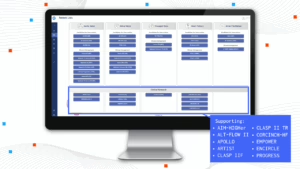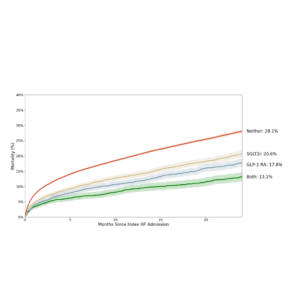Mike Dobbles, Chief Technology Officer of egnite, Inc, shares his unique journey from a satellite system expert to a MedTech guru…
AIMed AI Champions – Thursday, July 1st , 2021
In a career spanning more than 30 years, Mike Dobbles, has specialized in technology, analytics, and software. Prior to egnite, Mike served as senior director of engineering with Edwards Lifesciences where he assembled and led a 22-person team of software and IT Operations engineers that developed the CardioCare program. This groundbreaking health analytics platform would eventually become egnite’s flagship product.
Previous to his tenure at Edwards Lifesciences, Mike led engineering teams developing continuous glucose monitoring systems for the diabetes market at Medtronic and Dexcom. Mike’s healthcare and medical device experience also includes MiniMed, where he served in the role of project lead/senior software engineer developing devices and wireless technology for care management of diabetes. Mike began his career as a software and systems engineer building satellites for CTA Space Systems and Orbital Sciences Corporation.
Mike has a BS from the University of Illinois, a Master’s degree in analytics from Villanova, and is currently pursuing a graduate degree in bioinformatics at Johns Hopkins University.
“I remember in one of the early customer meetings, we delivered a report that identified a group of patients we believed hadn’t received appropriate follow-up,” says Mike Dobbles, Chief Technology Officer of egnite, Inc., the company that designed AI-driven platform, CardioCare. “A cardiovascular nurse at the site was reviewing the report and was shocked to discover her own father on the list. She revealed she attended every single doctor appointment with her father before he passed away, yet the fact that he met guidelines for severe AS was never discussed during these appointments. That’s very unfortunate. I think there is a huge role for algorithms to review patient data and ensure no one slips through the cracks in care.”
Dobbles believes that many people make the mistake of regarding the success of medical AI as being marked by algorithmic breakthroughs. When, in reality, it should be about grasping how incredibly complex and busy medicine is and figuring out ways to effectively assist clinicians.
“One of the algorithms I’m most proud of is the disease progression predictive model that egnite has just released,” he says. “It looks at how patients who were initially diagnosed with moderate aortic stenosis are expected to progress to severe disease over time. The moderate AS patient population can be difficult to stay on top of because the patient’s immediate needs are not acute. You have to work with a lot of institutions over many years before you have the depth of longitudinal data necessary to provide practical insights to clinicians on these types of challenges. That’s why when you have a breakthrough it can be quite satisfying.
“I remember completing the disease progress analysis at home during the COVID-19 pandemic lockdown and was so excited by the results that I showed it to the only audience I had nearby – my 13 and 11-year-old boys. I showed them how the progressive curves would vary according to the characteristics of the patients and explained to them how literally no one else in the world, apart from the three of us at that moment, had this insight. The algorithm underlying the analysis isn’t the fanciest one I’ve done, but if it can be used to deliver meaningful insights to clinicians that impacts patient care, then that’s the only thing that matters.”
When asked if that’s the reason that prompted him to move from space science to medical AI, Dobbles laughs; “I hate to say this; AI didn’t exist in my school days! I went into science because of my love for Carl Sagan and his book ‘Cosmos’. Sagan was my hero and as soon as I graduated, building satellite systems was all I wanted to do. Space science is fun and interesting. Unlike building a mobile application, building satellite systems rely on a diversity of talents. We need to know how to blend physics, algorithms and software, to arrive at the desired results. It’s extremely complex.”
Dobbles explains that complexity is similar in healthcare. “Healthcare entails many players. From clinicians, med device companies, health IT, data analysts, to patients and so forth, no one holds all the answers. They need to collaborate in this complex ecosystem to overcome some of the world’s most complex problems. The diversity of my technical background translates well to this environment.”
Dobbles is currently back in school, completing his second Master’s program in Bioinformatics at Johns Hopkins University. So what advice would he give to others looking to enter the AI space? “It has been a struggle for many to decide if they should undergo formal training in medical AI or make use of the abundance of resources available online,” he says. “My take is to find an area within healthcare that needs value-adding. From there, educate and enrich yourself with all that’s needed to help you reach your goal. There is no harm in going for some formal education when you feel it’s time. I am not at a point in my career where I need an additional degree, but I love to learn and studying bioinformatics gives me an opportunity to dig down into the crossover of biology and software.”
Dobbles sees the concerns about AI denying someone a job as disconnected from the reality of AI as simply a tool designed to help clinicians ensure patients receive the care they deserve. “In the real world, it’s not possible for clinicians to absorb every bit of patient information available to them and be absolutely sure there is nothing important that they are missing or that there isn’t something in that data that might be able to be used to make a more optimal choice for their patient,” he says. “AI can sort through vast quantities of information in ways that no human can. If the insights delivered by AI lead clinicians to make better decisions for their patient’s then we’re going in the right direction.”
Read the original article here.
CardioCare is a trademark of egnite, Inc. All other trademarks are property of their respective owners.



